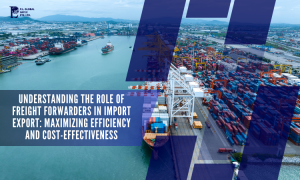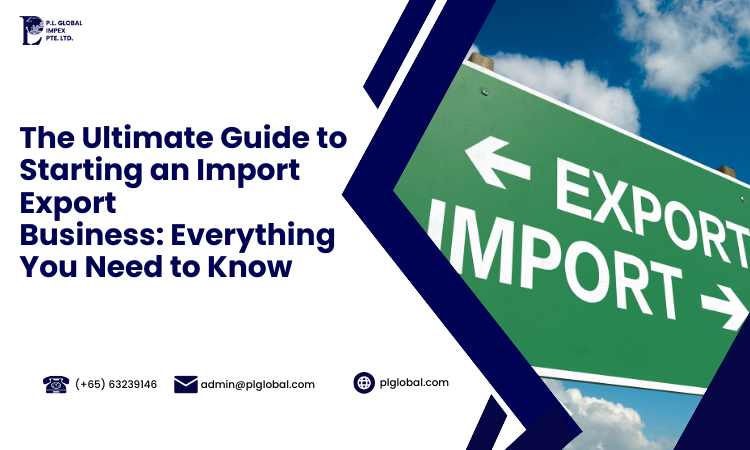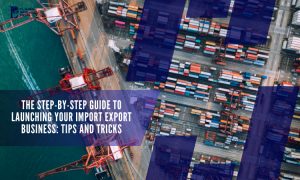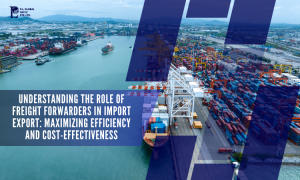Table of Contents
INTRODUCTION:
Are you prepared to broaden your business horizons and dive into the realm of international trade? Establishing an import-export company can be a lucrative and thrilling endeavor. We will lead you through every aspect of imports, including setting up an import-export company, handling the difficulties of global trade, and starting your own profitable import-export enterprise. Now let’s get started and discover all of the opportunities that lie ahead!How to Launch a Company That Imports and Exports
If you are enthusiastic about international trade and wish to take advantage of the rich import export market, launching your own import export company might prove to be a fruitful and fulfilling endeavor. But for newcomers in particular, understanding the intricate world of international trade can seem overwhelming. Be at ease! With this comprehensive guide, we’ll help you effectively begin your import-export business.Step 1: Planning and Research
Start by identifying target markets and possible possibilities through market research. Choose the best products to import or export by analyzing the industry’s demand and competitiveness. Make a thorough business strategy that details your objectives, budget, and promotional tactics.Legal Obligations in Step Two
Learn about the rules and laws governing the import and export of goods in the market you intend to enter. Register your import-export company and secure the licenses and permits required for lawful business operations.Step 3: Create Relationships with Suppliers and Customers
Create a solid network of trustworthy domestic and foreign suppliers and clients. To meet possible partners, go to conferences and trade exhibits. In order to guarantee more efficient operations and adherence to trade laws, think about working together with freight forwarders and customs brokers.Step 4: Transportation and Delivery
Recognize the logistics involved in shipping products across international borders. Ascertain which shipping options are most economical and successful for your company. To guarantee a smooth customs clearance process, familiarize yourself with export papers such as bills of lading, packing lists, and commercial invoices.Step 5: Promote your company
Establish a powerful online presence on social media and with a business website. Create a thorough marketing plan to draw in prospective clients and highlight your distinctive selling propositions.
The Key Essentials for a Successful Import Export Business: Industry Insights
A growing number of entrepreneurs are entering the import-export industry in an attempt to prosper in the constantly increasing global market. This industry presents amazing development and success chances with potentially large rewards. But entering this industry without having a firm grasp of its foundations can be a surefire way to fail. In international trade, imports and exports are intricate processes requiring careful planning, close attention to detail, and a profound comprehension of a variety of topics including laws, logistics, and consumer desires. Understanding the value of market research and due diligence is essential when starting an import-export company.Establishing a Robust Import Export Company
Maintaining a profitable import-export business requires careful planning, smart thinking, and a robust network of customers and suppliers. Building a successful import-export company requires developing connections with trustworthy suppliers and creating winning marketing plans. A thorough awareness of customs laws, tariffs, and documentation requirements is also necessary to ensure the seamless movement of goods across international borders. Working together with knowledgeable freight forwarders or customs officers can help to minimize risks and speed procedures.Crucial Actions to Launch an Import Export Company
There are a few important things to take into consideration for prospective business owners who want to start an import-export company. First and foremost, it’s critical to carry out market research to determine target niches and market wants. Your decisions about the kinds of things you should import or export will be informed by this knowledge. Second, compliance depends on an awareness of the legal and regulatory obligations, including those related to licenses and permits. During this phase, hiring legal counsel or experts knowledgeable in international trade rules can be quite beneficial. Finally, building trusting connections with buyers and suppliers is critical. You can create a reliable partner network by going to trade exhibitions, becoming a member of associations for your sector, and using internet tools.Exploring the Benefits of International Trade: How to Take Advantage of Imports and Exports
The global economy in today’s interconnected world depends on the transfer of goods and services across countries. Imports and exports, which promote international trade, are essential for advancing economic development and building international ties. Comprehending the advantages of participating in the import-export industry can lead to fascinating prospects for both enterprises and entrepreneurs.1. Promote Economic Growth:
Because they give access to a greater variety of goods and resources from around the globe, imports and exports are essential for economic growth. Businesses can increase their capacity to satisfy customer requests and diversify their product offerings by importing commodities that are not readily available or economically feasible to produce domestically. In a similar vein, exporting goods can boost earnings and expose them to new markets, both of which promote economic growth.2. Competitive Advantage:
By giving companies access to specialized resources, lower manufacturing costs, or distinctive products, import-export operations can give them a competitive edge. This benefit can make a company stand out from the competition, draw in more clients, and boost sales.3. Diversification and Risk Management:
By operating in several markets, an import-export company provides the chance to diversify revenue sources and lower risk. Businesses can lessen the effects of regional shifts in consumer demand or local economic swings by dispersing their operations throughout multiple regions.4. Collaboration and Cultural Exchange:
Through bringing together people and companies from other nations, international commerce fosters collaboration and cultural exchange. Working with foreign partners improves understanding between cultures, encourages innovation through information exchange, and builds connections that may result in future economic prospects.
Navigating the Legalities of Importing and Exporting: Understanding Customs and Regulations
Effectively managing the legal aspects of import and export is essential for any flourishing import-export enterprise. Comprehending customs and regulations guarantees seamless transactions and helps avert possible fines. We will go over the essential elements of adhering to rules and conventions when conducting business internationally in this blog part.1. Customs Compliance Is Important
Keeping import-export companies compliant with customs regulations is crucial. This guarantees compliance with laws established by the nations that import and export. Noncompliance may lead to expensive hold-ups, the possibility of having goods seized, and legal repercussions. Businesses can guarantee seamless cross-border operations by comprehending and adhering to customs regulations.2. A Synopsis of the Customs Laws
It’s critical to comprehend the customs laws that apply to your sector and prospective customers. Important things to think about include product certifications, documentation, labeling and packaging specifications, import duties, and requirements. It is essential to stay informed about regulatory changes to prevent non-compliance problems.3. Collaborating with Specialists
Consulting with professionals is strongly recommended while navigating the complex world of import-export restrictions. The laws of importing and exporting can be navigated with the help of consultants, customs brokers, and attorneys who specialize in international trade law.4. The Function of Technology
Improving compliance and streamlining import-export procedures are two benefits of employing technology-driven solutions. Tools that can streamline processes and guarantee compliance with rules include online platforms for document submission, shipment tracking, and automated customs management systems.5. Instruction and Training
Continual learning investments are essential for import-export companies. The risk of non-compliance is reduced when personnel receive training on customs compliance and regulation changes. Participating in industry associations and attending seminars can also offer beneficial networking opportunities and access to the most recent information about best practices and laws.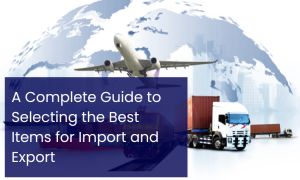
Choosing the Right Products to Import and Export: A Comprehensive Overview
The potential for great financial gain from an import-export business is there, but the key to success is choosing the appropriate products to import and sell. This thorough summary will give you insightful information and helpful hints to optimize your profit margins and decision-making process.1. Recognize the market:
Extensive market research is necessary. Examine import and export patterns at the moment, pinpoint lucrative markets, and think about opportunities for future expansion. Seek for goods with strong profit margins, little competition, and steady demand.2. Examine Standards and Quality:
Make sure the goods you select adhere to all applicable safety and quality requirements. In addition to safeguarding your reputation, this will avert any potential legal problems brought on by non-compliance.3. Locate Trusted Vendors:
Getting trustworthy suppliers is essential for your import-export company. Select vendors who can reliably provide goods at affordable costs without sacrificing quality. Before completing any transactions, confirm their qualifications and standing in the business.4. Assessing Profitability
Examine each product’s prospective profit margin carefully, taking into account things like manufacturing costs, shipping costs, customs charges, and consumer demand. To find out if the product can make a respectable profit margin, perform a cost-benefit analysis.5. Think About Logistics and Transportation:
When choosing products, take logistics and transportation costs into account. Fragile or perishable items might need special shipping arrangements, which would raise the total cost of the transaction. Make sure you can manage and deliver the selected items economically and efficiently. Recall that the secret to success in the import-export sector is to identify the proper products that will satisfy the needs of your target market and provide long-term profitability. You will be well on your way to developing a prosperous import-export enterprise if you adhere to these recommendations.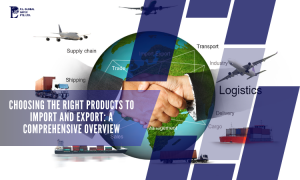
Building Strong Relationships with Suppliers and Buyers: The Key to a Thriving Import Export Business
Establishing trusting relationships with consumers and suppliers is essential for any import-export company to succeed in the global marketplace. A strong network of trustworthy partners is essential for success in this cutthroat market. Locating reliable suppliers who can reliably supply high-quality goods is crucial when it comes to imports. Identifying trustworthy suppliers requires careful investigation and due diligence, which is the first step towards creating a solid foundation. It’s critical to create effective channels for communication, work out advantageous terms, and make sure that everyone engaged is aware of their own tasks and obligations. Importers can obtain reasonable prices, prompt deliveries, and access to a large variety of items by cultivating strong connections with their suppliers. Conversely, exporters need to concentrate on building solid bonds with trustworthy purchasers. Effective communication, mutual understanding, and trust are the cornerstones of these relationships. Exporters must comprehend the unique requirements and inclinations of their intended market and modify their offerings accordingly. Exporters can create enduring relationships and obtain a competitive edge in the global market by keeping lines of communication open and offering top-notch customer service. In the import-export industry, fostering strong bonds requires more than just signing papers and completing deals; it also entails developing a reputation for dependability and trust that transcends financial exchanges. These connections are crucial to an import-export company’s success, and by taking the time to develop and maintain them, companies can open up new doors for development and expansion in the global commerce sector.